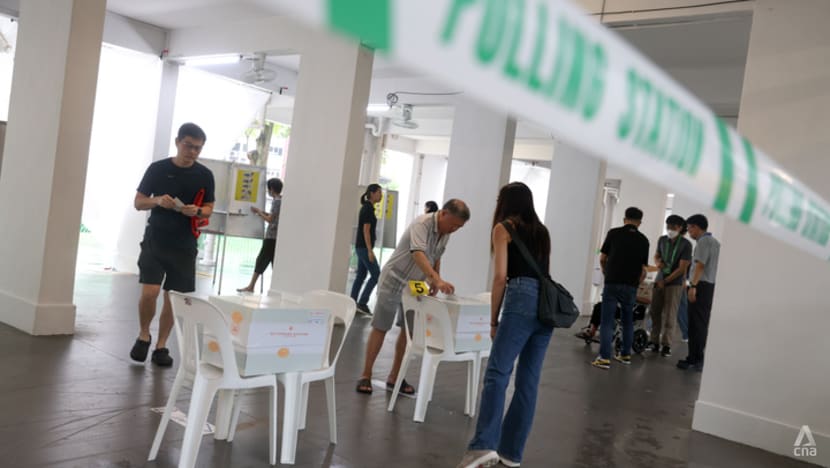Cost of living was top voter concern in GE2025, IPS post-election survey shows
More voters also rated honesty, efficiency and experience in grassroots and community work more highly than in 2020 when evaluating candidates.

Voters casting their ballots at the void deck of Block 608 Clementi West Street 1 for the 2025 Singapore General Election on May 3, 2025. (Photo: CNA/Mak Jia Kee)

This audio is generated by an AI tool.
SINGAPORE: The cost of living was the top issue on voters’ minds in this year’s General Election, followed by the need for efficient governance and the affordability of homes, a post-election study by the Institute of Policy Studies (IPS) think tank has found.
The issue also saw the largest increase in respondents rating it as “very important” compared to the 2020 polls.
Held on May 3, the General Election saw the People’s Action Party (PAP) secure 65.57 per cent of the popular vote in Prime Minister Lawrence Wong’s first electoral outing as Singapore’s fourth leader.
The IPS survey, released on Tuesday (Sep 2), is part of a long-running series conducted after every election since 2006. This year’s study involved 2,056 citizens aged 21 and above, polled between May 22 and Jun 1.
The research team comprised senior research fellows Gillian Koh and Teo Kay Key, adjunct principal research fellow Tan Ern Ser, and research assistant Cheow Jin Jie.
MATERIAL CONCERNS DOMINATE VOTER PRIORITIES
Cost of living was rated “very important” by 74 per cent of respondents – the highest proportion in the history of the IPS post-election survey. The concern was more pronounced among older and returning voters, and least so among those aged 21 to 29 and first-time voters.
Other materialist concerns also gained ground. The need for a good and efficient government was rated “very important” by 69 per cent of respondents – another record high. This concern was stronger among Chinese voters and residents of larger Housing Board flats.
Affordability of homes, introduced as a new survey item this year, was ranked third, with 61 per cent rating it “very important”. It mattered most to those living in private housing and least to males and those aged 55 to 64.
This shift is part of a heightened focus on other materialist concerns too, like the jobs situation, neighbourhood facilities and upgrading of flats, said the researchers.
Fairness in government policy also emerged as a key issue, cited by 57 per cent as “very important” – the highest ever. It was most significant for residents in private housing, professionals and degree holders, but the least important issue for those aged 21 to 29, first-time voters and those from the upper-middle class.
Compared to 2020, the cost of living saw the largest jump in the proportion of respondents calling it a "very important" issue – up 27 percentage points. Neighbourhood facilities rose by 17 percentage points, especially among older residents in larger HDB flats. Flat and estate upgrading also gained traction, with a 14-point rise.
Rounding out the top five were fairness of government policy and the job situation, both up by 11 percentage points.
SHIFTING PERCEPTIONS OF PARTY CREDIBILITY
The study also found a convergence in credibility ratings between the PAP and Workers’ Party (WP), which will be the only two parties in parliament when it opens on Sep 5.
The PAP’s mean credibility score dipped from 4.1 in 2020 to 3.9, matching the WP’s consistent 3.9 rating over the past two elections.
Meanwhile, the Progress Singapore Party’s (PSP) score declined from 3.5 to 3.2, falling below the Singapore Democratic Party (SDP), which edged up from 3.2 to 3.3.
Support for the political status quo rose among voters aged 21 to 39 – a surprising trend, said the researchers. In contrast, support for political pluralism grew among those aged 40 and above. Political pluralism refers to having elected opposition party members in parliament, for checks and balances and to ensure that different views are expressed.
The proportion of respondents who "agreed" or "strongly agreed" that the PAP is credible dropped by 17 percentage points to 69 per cent, while the WP also saw a decline of 14 points to 65 per cent.
The PAP drew greater support from voters aged 65 and above, while the WP was more popular among those aged 21 to 39. Both parties attracted upper-middle income voters, but the WP also appealed to the middle-middle income group.
Ethnic minorities were likely to rate the WP and other opposition parties as being credible, the study found.
Voters also rated honesty, efficiency and experience in grassroots and community work more highly than ever when evaluating candidates.
Honesty ranked as the most important trait, especially among those aged 55 to 64 and private housing residents.
Fairness was valued more by university and professional degree holders and private housing dwellers, who also put more emphasis on hard work and candidates' commitment.















